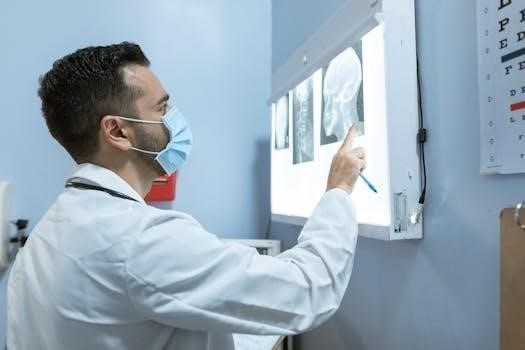
This advanced physiology and pathophysiology text is designed to address the specific learning needs of future nurse practitioners. It provides a strong basic science foundation for advanced nursing practice, bridging clinical experience with advanced knowledge. This resource empowers NPs with essential knowledge.
Importance of Pathophysiology for NPs
A strong understanding of pathophysiology is crucial for nurse practitioners (NPs) as it forms the bedrock for effective clinical practice. This knowledge empowers NPs to diagnose, treat, and manage a wide range of diseases and conditions, enabling them to provide evidence-based patient care. Delving into the intricate mechanisms of disease allows NPs to navigate complex patient presentations, understanding the underlying processes driving symptoms. A solid grasp of pathophysiology facilitates accurate interpretation of assessment data, leading to more informed clinical decisions and targeted interventions. This knowledge is fundamental to selecting appropriate treatment strategies and evaluating their effectiveness. Furthermore, it enhances the NPs ability to predict potential complications and proactively manage them, ensuring optimal patient outcomes. Ultimately, a robust understanding of pathophysiology is indispensable for NPs to deliver high-quality, patient-centered care, making it an essential element of their advanced practice. It is the key that unlocks the complexities of disease.

Core Concepts in Advanced Pathophysiology
This section explores the fundamental principles of disease development, focusing on mechanisms of disease and cellular responses to injury. These core concepts provide the basis for understanding complex pathologies and patient presentations.
Mechanisms of Disease Development
Understanding the mechanisms of disease development is crucial for nurse practitioners to effectively diagnose and manage patient conditions. This involves delving into the intricate processes at the molecular, cellular, and tissue levels that lead to disease manifestation. These mechanisms encompass a wide range of factors, including genetic predispositions, environmental influences, infectious agents, and immunological responses. Furthermore, it is essential to examine how these factors interact to disrupt normal physiological processes. This includes exploring the pathways that lead to cellular dysfunction, tissue damage, and ultimately, the clinical signs and symptoms of a disease. A comprehensive understanding of these mechanisms is essential for NPs to make sound clinical decisions and implement effective treatment strategies, moving beyond symptom management to target the underlying pathological processes. This knowledge is paramount in providing evidence-based care.
Cellular and Tissue Responses to Injury
Cellular and tissue responses to injury are fundamental aspects of pathophysiology that nurse practitioners must understand to effectively assess patient conditions. These responses involve a complex interplay of biochemical and physiological processes that occur at the cellular level when tissues are damaged. The body’s reaction to injury can range from acute inflammation to chronic adaptations, including cellular regeneration, repair, or the formation of scar tissue. These responses are initiated by various stimuli, such as physical trauma, infections, or chemical exposure, that trigger a cascade of events at the cellular level. Understanding the different cellular and tissue reactions—like hypertrophy, atrophy, metaplasia, and dysplasia—is critical for NPs to differentiate between normal adaptive mechanisms and pathological conditions. This knowledge helps in accurately diagnosing disease and formulating appropriate treatment plans. Further, it allows anticipation of potential complications arising from tissue injury.

Organ System Pathophysiology for Advanced Practice
This section dives into the intricate mechanisms underlying diseases within major organ systems. It is crucial for nurse practitioners to diagnose, treat, and manage a wide range of conditions effectively using evidence-based practice.
Cardiovascular Pathophysiology
A deep understanding of cardiovascular pathophysiology is paramount for nurse practitioners, enabling them to effectively manage patients with heart-related conditions. This area explores the complex mechanisms behind various cardiac diseases, including coronary artery disease, heart failure, and arrhythmias. Nurse practitioners must grasp the intricate details of altered cardiac function, hemodynamic changes, and the consequences of vascular dysfunction. This knowledge allows for accurate diagnoses, implementation of appropriate treatment strategies, and the ongoing management of cardiovascular disorders. It’s important to understand the cellular and molecular level changes that lead to these conditions. Moreover, understanding how these changes translate into clinical manifestations is essential for providing optimal care. The goal is to promote evidence-based practice and improve patient outcomes in this critical area of healthcare.
Respiratory Pathophysiology
Respiratory pathophysiology is a crucial area of study for nurse practitioners, focusing on the mechanisms underlying various lung and breathing disorders. This section delves into conditions like asthma, chronic obstructive pulmonary disease (COPD), pneumonia, and acute respiratory distress syndrome (ARDS). Nurse practitioners must understand the complex interplay of factors affecting lung function, gas exchange, and respiratory mechanics. A thorough grasp of inflammation, infection, and structural changes within the respiratory system is essential for accurate diagnosis and effective management. This knowledge enables NPs to differentiate between acute and chronic conditions, initiate appropriate therapies, and monitor patient responses to treatment. Furthermore, understanding the impact of respiratory dysfunction on other organ systems is key to providing holistic patient care. This empowers NPs to make informed decisions and deliver quality care.
Neurological Pathophysiology
Neurological pathophysiology is a vital component of advanced practice nursing, focusing on disorders of the central and peripheral nervous systems. This involves understanding the intricate mechanisms behind conditions such as stroke, epilepsy, multiple sclerosis, and Parkinson’s disease. Nurse practitioners must grasp the cellular and molecular processes that lead to neuronal dysfunction, inflammation, and neurodegeneration. Knowledge of neurotransmitters, neural pathways, and brain structures is essential for accurate diagnosis and treatment planning. This area emphasizes the importance of recognizing subtle neurological changes, interpreting diagnostic tests, and implementing evidence-based interventions. Moreover, understanding the impact of neurological disorders on a patient’s cognitive, motor, and sensory functions is crucial for providing holistic and patient-centered care. This knowledge equips NPs to manage complex neurological conditions effectively, improving patient outcomes.

Applying Pathophysiology in Clinical Practice
Applying pathophysiology is crucial for nurse practitioners to effectively diagnose, treat, and manage various diseases. Understanding the mechanisms of disease empowers NPs to provide evidence-based care and improve patient outcomes through clinical practice.
Diagnosis and Treatment Strategies
A deep understanding of pathophysiology is paramount for nurse practitioners in formulating accurate diagnoses and effective treatment strategies. By grasping the intricate mechanisms of disease, NPs can discern subtle clinical presentations and differentiate between various conditions with similar symptoms. This knowledge base is essential for selecting appropriate diagnostic tests, interpreting results accurately, and developing personalized treatment plans. Furthermore, a robust grasp of pathophysiology enables nurse practitioners to anticipate potential complications, monitor patient responses to therapy, and make necessary adjustments to care regimens. This process involves considering not only the primary disease process but also any secondary impacts on other organ systems. Such comprehensive knowledge allows NPs to move beyond simply managing symptoms toward addressing the root causes of illness. This expertise leads to better patient outcomes and a more effective healthcare practice.
Evidence-Based Practice and Pathophysiology
Integrating pathophysiology with evidence-based practice is crucial for nurse practitioners to deliver the highest quality care. A solid understanding of the mechanisms underlying disease processes empowers NPs to critically evaluate research findings and apply them effectively to clinical practice. This integration ensures that treatment decisions are not only based on theoretical knowledge but are also grounded in robust scientific evidence. Nurse practitioners utilize their pathophysiology knowledge to assess the validity and applicability of clinical studies, ensuring that treatment protocols are tailored to the individual needs of each patient. Evidence-based practice, informed by pathophysiology, allows NPs to adopt the most current and effective approaches to patient care, avoiding outdated practices and promoting positive health outcomes. Furthermore, this approach facilitates a continuous cycle of learning and adaptation, as new research emerges and clinical practice evolves. This integration ensures that treatment decisions are both theoretically sound and supported by empirical evidence.

Resources for Learning Advanced Pathophysiology
Various resources are available for learning advanced pathophysiology, including textbooks like “Pathophysiology⁚ The Biologic Basis for Disease in Adults.” Online materials and review guides also provide valuable support for nurse practitioners.
Textbooks and Online Materials
For nurse practitioners seeking to deepen their understanding of advanced pathophysiology, a variety of resources are available. Textbooks, such as “Pathophysiology⁚ The Biologic Basis for Disease in Adults,” offer comprehensive coverage of disease mechanisms and processes. These texts often delve into the intricate details of cellular and organ system pathology, providing a strong foundation for advanced clinical practice. Additionally, numerous online platforms and digital resources provide supplementary materials, including interactive modules, case studies, and review questions. These online tools can enhance learning and provide flexible study options. Furthermore, review books specifically tailored for nurse practitioner board exams, such as the StatPearls review, can assist in exam preparation by targeting key content areas. When selecting resources, it is important to consider those that align with the NP curriculum and learning objectives, ensuring a well-rounded understanding of the complex concepts in pathophysiology, ultimately aiding in better patient care.